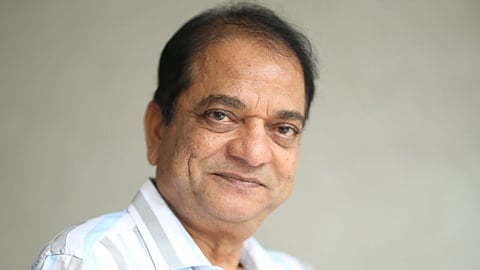

At a time when mainstream Telugu cinema is inundated with hero-driven action films, veteran filmmaker K Vijaya Bhaskar returns with Usha Parinayam, a romantic drama seemingly reminiscent of the wholesomeness of 2000s Telugu cinema. Some of the most popular films of that period, be it Nuvve Kavali, Manmadhudu, or Malliswari, were directed by Vijaya Bhaskar, and he now attempts a similar outing.
Besides Tanvi Akaanksha, who plays the titular protagonist, Usha Parinayam stars Vijaya Bhaskar’s son, Sree Kamal in a lead role. When asked if he specifically wrote the script suitable for his son, Vijaya Bhaskar says, “We had also narrated the idea to other actors. However, coincidentally, this script matched Kamal’s age. It needed a certain body language. The film is a youthful entertainer.” The Nuvve Kavali director adds that Usha Parinayam is primarily a story about a young woman and her choices. “A woman cannot, and should not, live according to others’ conditions. Nobody has the right to dominate her, not even her father or brother. You need to respect a woman and her choices.” The director reminds us that he is trying to make a statement about this topic in an entertaining way.
The Nuvve Kavali director feels that the story needs to become the driving force of mainstream cinema yet again. Recalling his experience making films like Malliswari and Jai Chiranjeevi, among others, he says, “I have worked with the biggest of stars. They are the most disciplined and always give importance to the script. Now, the stars don’t do that anymore. The hero has become the story, but it’s the story that should be the hero.” Lest we mistake him, the director reassures us that he believes equally in the concept of ‘heroism’ in cinema. “It is just that hero elevation needs to come organically from the script, not from close shots of the hero's boots and shades. When a moment of crisis comes, what does a common man do that makes him a hero? I prefer to focus on those moments,” he asserts. Vijaya Bhaskar also believes that there is less focus on scriptwriting these days. He adds, “Earlier, we used to spend six months on locking a script, and shoot it in 30–40 days. Now, it’s the opposite.”
The filmmaker particularly sounds upset abound the increasing amount of violence in mainstream cinema. While stating that he likes the action film genre as much as the next person, he says that filmmakers need to cater to everyone in the audience. He reflects, “If you watch movie trailers these days, everyone is holding a knife or chopping limbs. We begin to wonder whether we have come to a cinema theatre or a graveyard; there is so much blood on screen. This pattern needs to change. Movies should remain a family experience, like mealtime, where everyone sits together. Every kind of cinema needs to arrive, or else, it will get boring.”
Most importantly, Vijaya Bhaskar is a strong proponent of retaining a sense of wholesomeness in films, which he feels has been diluted because of the influx of OTT and the ensuing ecosystem. He feels that the audience have stopped coming to theatres because of the lack of a special movie experience. He states, “If we analyse, we aren’t giving them a theatrical experience.” The director recalls refusing an offer to make a film for OTT when it required him to keep the dialogue more colloquial. He says, “It’s a matter of principle for me. A lot of current movies have indecent or street-side language. I will quit cinema rather than doing such stuff.” He also describes the success of some of these contemporary movies as ‘fluke,’ adding, “Some films may work, but it cannot become the standard. Movies don’t necessarily need to have a social message, but there is a certain dignity and responsibility to cinema — we can’t ruin that either.”
In the past couple of years, Telugu cinema’s affinity for romantic films has evidently seen a decline. When asked about the possible reasons for the decline, K Vijaya Bhaskar is quick to note that, while many things have changed in the ecosystem, the audience is not one of them. He notes, “If we show the content properly, it’s enough to bring in the audience. However, today we are making films like arranging suitcases – just filling in spaces to tick off boxes.”
The filmmaker also reflects on the changing definition of love, mentioning how his film is a small attempt in reminding the audience of its true essence. He notes, “These days, the meaning of love has changed." Without mentioning any particular movies, the director explains, “If it is violent, it cannot be love. If it’s love, it cannot be violent.” The director further ruminates about the subject. “If love demands something in return, it becomes transactional in nature. I wanted to say something about how the institution of love is being corrupted. Usha Parinayam is my definition of love."